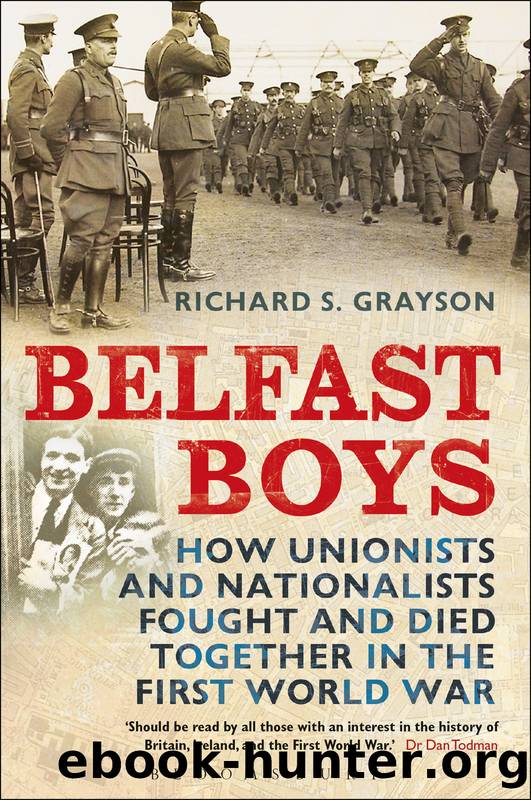Belfast Boys by Grayson Richard S.;

Author:Grayson, Richard S.;
Language: eng
Format: epub
Publisher: Bloomsbury Publishing Plc
Published: 2010-05-31T00:00:00+00:00
When the battle began on 31 July, the 2nd and 9th RIRifles and 47th Brigade were in reserve. It was expected that the 9th RIRifles would advance once the 55th Division had gained ground, while 47th Brigade would do the same behind the 15th Division. Yet both the 55th and 15th divisions, after some initial progress, were driven back by the Germans. Due to heavy rain, a further attack was postponed. Instead, the Ulster Division moved towards the front at the Wieltje sector on 2 August. In six days there they were under constant German shell-fire. According to Cyril Falls, a member of the divisionâs General Staff, the heavy rain on 31 July had made the area a âsea of mudâ. Wieltje was clearly seared on his memory when he wrote, âWieltje dug-outs! Who that saw it will forget that abominable mine, with its ⦠water that flowed down its main passages and poured down its wall ⦠its smells, its huge population of men â and of rats?â Even the paths leading back from the trenches had their share of horrors. Falls wrote that dead bodies did not affect men greatly, but that one spectacle, âthe mangled remains of a complete party of artillery carriers, six men and twelve horses ⦠burnt itself upon the brains of those who saw itâ.13
Meanwhile, 47th Brigade had moved to the front in the Frezenberg sector, close to the Ulster Division. As âthe rain poured incessantlyâ, the 6th Connaughts found all the trenches âin a terrible conditionâ and worked as stretcher-bearers helping the 55th Division search for wounded men. The war diary noted on 6 August that conditions were âas adverse as could be imaginedâ with âthe ground a sea of mudâ and shelling constant. Twenty-four men were lost in the 6th Connaughts between 2 and 11 August. Three of these, Lance-Corporal Patrick McKillen and Privates Thomas English and James McIlwee, were Belfast recruits. Both McKillen and English came from the Falls, the former from Oranmore Street, the latter from Balaclava Street, and McKillen had received the divisional certificate for gallantry in 1916.14
The 2nd RIRifles joined the fray on 10 August at Westhoek, having spent the previous five days under shell-fire in the trenches. At 4.35 a.m. they advanced behind a barrage and secured two concrete dugouts, taking the Germans by surprise to gain a strong-point that might otherwise have cost many lives. The battalion then secured its next objective and consolidated. The war diary described how the Germans fled and were therefore âannihilatedâ in the British barrage.15 The 2nd RIRifles then held the line at Westhoek against successive German counter-attacks which were broken up first by artillery and then by the action of men in the trenches repelling German patrols. With the consolidation accomplished, the depleted battalion was withdrawn from the line on the night of 11 August. Although the initial advance had been relatively easy, the counter-attacks had taken their toll, as had the shelling before the advance. Forty men were killed over 10 and 11 August, and wounds accounted for hundreds more.
Download
This site does not store any files on its server. We only index and link to content provided by other sites. Please contact the content providers to delete copyright contents if any and email us, we'll remove relevant links or contents immediately.
Room 212 by Kate Stewart(4117)
The Crown by Robert Lacey(4117)
Endurance: Shackleton's Incredible Voyage by Alfred Lansing(3856)
The Iron Duke by The Iron Duke(3653)
The Rape of Nanking by Iris Chang(3529)
Killing England by Bill O'Reilly(3465)
Joan of Arc by Mary Gordon(3271)
Say Nothing by Patrick Radden Keefe(3072)
I'll Give You the Sun by Jandy Nelson(2849)
Hitler's Monsters by Eric Kurlander(2740)
Shadow of Night by Deborah Harkness(2739)
Margaret Thatcher: The Autobiography by Thatcher Margaret(2691)
Mary, Queen of Scots, and the Murder of Lord Darnley by Alison Weir(2683)
Darkest Hour by Anthony McCarten(2655)
Blood and Sand by Alex Von Tunzelmann(2614)
Red Famine: Stalin's War on Ukraine by Anne Applebaum(2472)
Eleanor & Park by Rainbow Rowell(2401)
The One Memory of Flora Banks by Emily Barr(2354)
Book of Life by Deborah Harkness(2279)
